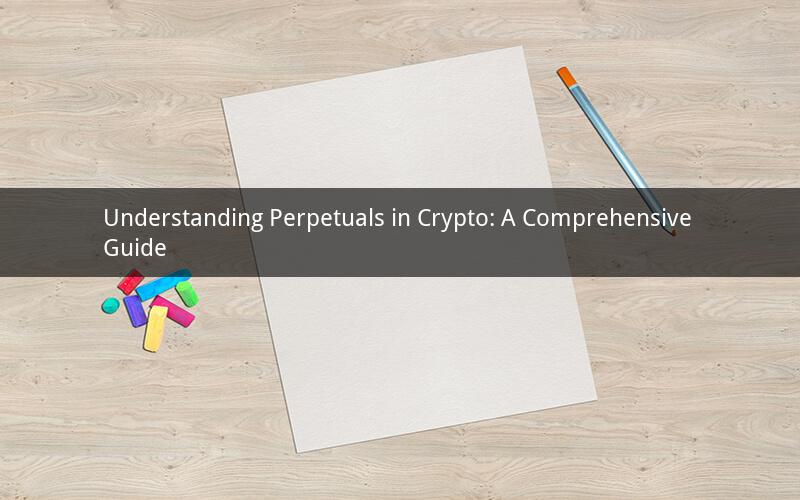
Introduction:
In the ever-evolving world of cryptocurrencies, perpetuals have emerged as a popular trading instrument. But what exactly are perpetuals in crypto? This guide will delve into the concept, how they work, their advantages, and disadvantages. We will also explore the risks associated with perpetuals and provide insights on how to trade them effectively.
What are Perpetuals in Crypto?
Perpetuals are a type of cryptocurrency derivative that allows traders to speculate on the price of an asset without an expiration date. Unlike traditional futures contracts, perpetuals have no settlement date, which means traders can hold their positions indefinitely. They are often used for trading popular cryptocurrencies like Bitcoin, Ethereum, and Litecoin.
How Do Perpetuals Work?
Perpetuals operate through a unique mechanism called funding rates. Funding rates are determined by the demand and supply of the perpetual contract, and they act as a mechanism to keep the price of the perpetual in line with the spot price of the underlying asset.
When the funding rate is positive, traders who are long (holders of buy positions) pay traders who are short (holders of sell positions). Conversely, when the funding rate is negative, traders who are short pay traders who are long. This mechanism ensures that the price of the perpetual remains close to the spot price of the underlying asset.
Advantages of Perpetuals
1. Leverage: Perpetuals offer high leverage, allowing traders to control a large position with a smaller amount of capital.
2. 24/7 Trading: Perpetuals can be traded at any time, unlike traditional futures contracts, which have set trading hours.
3. No Settlement Date: Traders can hold their positions indefinitely, providing flexibility and the ability to trade in line with long-term market trends.
4. No Counterparty Risk: Perpetuals are traded on decentralized exchanges, eliminating the risk of counterparty default.
Disadvantages of Perpetuals
1. High Risk: Perpetuals can lead to significant losses, especially when used with high leverage.
2. Funding Rate Volatility: Funding rates can fluctuate significantly, leading to unexpected costs or gains for traders.
3. Complexity: Perpetuals can be complex to understand and trade, requiring a strong grasp of the underlying mechanics.
4. Market Manipulation: Since perpetuals are traded on decentralized exchanges, they can be vulnerable to market manipulation.
Risks Associated with Perpetuals
1. Market Manipulation: Perpetuals can be subject to market manipulation, as traders may attempt to influence the price of the underlying asset.
2. Funding Rate Fluctuations: Unexpected changes in funding rates can lead to significant losses for traders.
3. High Leverage: Using high leverage can amplify gains, but it can also amplify losses, potentially leading to margin calls and liquidations.
How to Trade Perpetuals Effectively
1. Understand the Mechanics: Familiarize yourself with the mechanics of perpetuals, including funding rates and how they affect your trading.
2. Risk Management: Set a stop-loss and take-profit level to manage your risk effectively.
3. Use Leverage Wisely: Avoid using excessive leverage, as it can lead to significant losses.
4. Stay Informed: Keep up with market news and trends to make informed trading decisions.
5. Practice with a Demo Account: Before trading with real capital, practice with a demo account to gain confidence in your trading strategy.
FAQs
1. Q: What is the difference between perpetuals and traditional futures contracts?
A: Perpetuals have no expiration date, while traditional futures contracts have a set settlement date. Perpetuals are also traded on decentralized exchanges, while futures contracts are typically traded on centralized exchanges.
2. Q: Can I lose more money than I deposited when trading perpetuals?
A: Yes, you can lose more money than your initial deposit when trading perpetuals, especially when using high leverage. This is due to the high volatility and leverage involved in perpetual trading.
3. Q: How can I minimize my risk when trading perpetuals?
A: You can minimize your risk by setting stop-loss and take-profit levels, using leverage wisely, and staying informed about market trends and news.
4. Q: Are perpetuals suitable for beginners?
A: Perpetuals can be complex and risky, making them less suitable for beginners. It is recommended that beginners start with simpler trading instruments like spot trading before moving on to perpetuals.
5. Q: Can I short sell perpetuals?
A: Yes, you can short sell perpetuals, allowing you to profit from a falling market. However, short selling carries its own set of risks and should be approached with caution.